I didn’t know “Dark Academia” was a Thing until my younger, much cooler friend showed me some Instagram accounts. “It’s an aesthetic,” she said, recommending that I buy some female Sherlock Holmes / librarian attire. But it’s so much more than an aesthetic. To me it’s a mood, a strangely welcome feeling of claustrophobia, of being trapped in a single location, but a cozy location with dark nooks to explore.
When I started writing what would become my debut novel, Never Saw Me Coming, I started with the basic premise that it would be about a program for diagnosed psychopaths hosted at a psychology department at a university. I love college novels, and hadn’t seen many mysteries taking place on campus. (If it were up to me, Veronica Mars would have kept on cruising after Season 3 and stayed at college indefinitely.) I’m a big believer that setting should be as tangible as character in fiction, and in many ways it pulls the most weight in terms of setting mood and atmosphere. School is an intriguing environment because we all have some familiarity with it which means that everyone can imagine themselves in the space. The often Gothic halls of academia, crowded frat basements, and eerily empty library stacks lend themselves so well to mysteries. Brightly lit classrooms might seem safe, but not if you think about the fact that academic buildings are often left unlocked and anyone can wander in. Drunken nights out are practically a necessity in college, but consider how dangerous they would be if there was a killer on campus (setting aside the “normal” dangers of just being a young woman trying to have fun while out dancing.)
Here are my picks for some of my favorite school-based mysteries where the setting is a critical component of the story.

Dare Me, Megan Abbott
In one of the voicey-est thrillers I’ve ever read, Dare Me follows a group of competitive high school cheerleaders in their senior year. The book revels in an extreme sort of first-person claustrophobia—you’re both deeply embedded inside the main character Addy’s head, but also into the tight-knit group of cheerleaders. Addy is chief lieutenant to top Mean Girl Beth, who is enormously threatened by their new cheerleading coach, who doesn’t seem to think Beth is as great as everyone else thinks she is. When an apparent suicide is discovered with potential links to the squad, things start to get dicey.
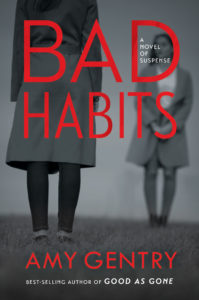
Bad Habits, Amy Gentry
I have a PhD in social psychology and actually loved my time at grad school, but there was still something so delicious about Gentry’s often biting commentary on academia. In this thriller, her characters are getting graduate degrees in . . . something? Mac and Gwen, two girls from radically different economic backgrounds, are close friends in a humanities department, where Gentry never quite tells us what they’re studying, but does give us hints about just how important everyone thinks it is. Hundreds of PhDs in the humanities will graduate with no hope of securing a tenure track position, and Mac and Gwen are in a cutthroat competition for limited resources—whether in the form of fellowships or attention. Doctoral programs inherently involve highly intelligent, competitive people, and one too many college advisors seem to have boundary issues combined with crazy inappropriate expectations for their students. Just how far will one woman go to be successful in what is already a toxic environment?
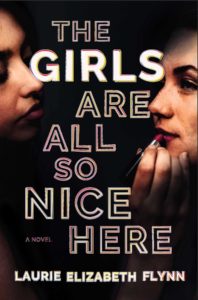
The Girls Are All So Nice Here, Laurie Elizabeth Flynn
If you’re a woman, you either had a friend like Sully or you desperately wanted one. Someone wild, effortlessly cool, someone who doesn’t give a fuck. Someone you are helplessly drawn towards despite the fact that reason tells you that they will wreck your life. Freshman Amb befriends the destructive Sully, who stands in stark contrast to Amb’s kind, milquetoasty roommate Flora. Flora studies while Sully parties and does drugs and nudges Amb towards being her absolutely worst self. Someone gets betrayed and someone gets killed, and you’re reminded of just how mean mean girls can be.
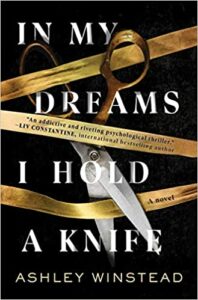
In My Dreams I Hold a Knife, Ashley Winstead
Jessica Miller returns for her ten-year college reunion, both anticipating and dreading the notion of being reunited with her group of besties, formed her Freshman year of college. College was all fun and games until one of them was killed, and nothing was ever quite the same, especially for Jessica, who might be keeping secrets about exactly what happened. One thing I particularly liked about the book is the exploration of the friendships among the group of six people, including the individual dyads and dynamics and how they changed over time. In this book, no one can be trusted and the friendships turns out to be not so cuddly and heartwarming.
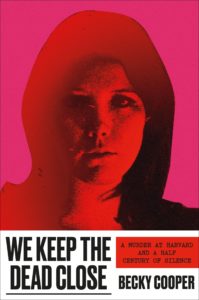
We Keep the Dead Close, Becky Cooper
I can’t stop recommending this book to people, including by badgering people who are reluctant to read true crime nonfiction. But this is a book like no other true crime investigation that I have ever read. It’s quite long—clocking in at 500 pages—and I was surprised to find myself relishing every part. The book begins with a killer premise: the author, an undergraduate at Harvard, is talking to some older students in the Archaeology department about an urban legend about a girl who was murdered in that same department back in the 60s. Yes, says the older student, and the professor who did it is still here. Then starts a long, winding investigation that is personal in startling ways, and you do get to find out whodunit (I would recommend avoiding spoilers about the case on the internet). This book is not just the story of a murder, but a deeply felt, fully drawn portrait of Jane Britton, the victim, a spunky, fierce girl who feels so tangible. This book also explores some of the troubling dynamics between professors and their graduate students, and the sexism—both blatant and not—in academic departments. But most impressively, it draws its “characters” with such sensitivity that it is also a meditation on grief that I found myself tearing up at a few times.
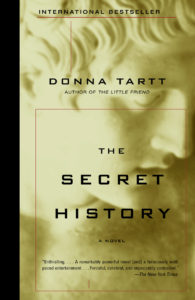
The Secret History, Donna Tartt
I can’t write a list like this and not include what I feel reigns as supreme queen of all college-based mysteries. Is this book about terrible people? Do they do terrible things for no good reason? Are they deeply self-involved in the study of Classics in a way that feels remarkable pre-2008 Financial Crisis / discussions of the ratio of student debt to the practical value of one’s undergraduate degree? There is a character named Bunny in this book. There is a bacchanal—I don’t mean they throw a wild rager where they drink too much, throw up, do drugs, break a table, and order Taco Bell. I mean it is specifically planned to be a bacchanal, because, you know, Classics, and I’m pretty sure no one stopped at the store to get Bugles and Miller Lite. I was a teenager when I read this book, and the world, college, and the people who attend it, seem radically different than the early 90s when this book was published, and I’m not quite sure I would view the book the same after spending a decade or so on college campuses. I do know that if I come across a Bunny in real life that I will head in the opposite direction.
***


















